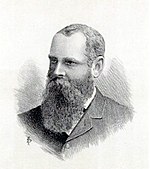Matthew Henry Davies, Date of Birth, Place of Birth, Date of Death
TweetMatthew Henry Davies
Australian politicianAbout Matthew Henry Davies
- Sir Matthew Henry Davies (1 February 1850 – 26 November 1912) was an Australian politician, who served as Speaker of the Victorian Legislative Assembly.
- He was also a leading figure in the Victorian land boom, resulting in his bankruptcy in 1894 and subsequent trial on conspiracy charges. Davies was the son of Ebeneser Davies and his wife Ruth, daughter of Mark Bartlett, of Bracknell, Berks, England, and grandson of the Rev John Davies, of Trevecca College, South Wales.
- He was born at Geelong in 1850, and educated at the Geelong College, and matriculated at the University of Melbourne in 1869.
- He was admitted a solicitor of the Supreme Court of Victoria in 1876, and married Elizabeth Locke Mercer, eldest daughter of the Rev.
- Peter Mercer, D.D., of Melbourne, Presbyterian minister.
- They produced a family of six children—Arnold Mercer Davies 1876, Marion Agnes Davies 1877, Henry Gascoigne Davies 1879, Beatrice Elizabeth Davies 1880, Muriel Kate Davies 1882, and Olive Blanche Davies 1884. For five years davies was honorary secretary to the Council of the Law Institute of Victoria, and was a Justice of the Peace for the central bailiwick.
- He was mayor of the City of Prahran from 1881 to 1882.
- Davies represented St Kilda in the Legislative Assembly from 1883 to 1889; was a member of the Royal Commission on Transfer of Land and Titles to Land in 1885; was sworn of the Executive Council in February 1886, and held a portfolio in the Gillies–Deakin Government as a Minister without office from 1886 to 1887.
- He visited England in connection with the Colonial and Indian Exhibition while a member of the Victorian Government.
- He was Chairman of the Royal Commission on Banking in 1887, and was elected Speaker of the Legislative Assembly in October 1887.
- He was returned unopposed for Toorak in 1889, and unanimously re-elected Speaker in the same year.
- He was knighted in 1890, and he gave 10,000 pounds to the Imperial Institute and other public objects in the Jubilee year of Queen Victoria's reign.
- Beginning in 1877 Davies had become a major land speculator, taking advantage of the spectacular increase in land values in Victoria in the boom decades that followed the Victorian Gold Rush of the 1850s.
- By 1887 he controlled a network of 40 companies, in which Victorian and overseas investors invested millions of pounds.
- Like many other public figures, he was caught in the crash of early 1892.
- His companies suspended payments in March.
- Davies resigned from Parliament and sailed to London to try to arrange finance to rescue his business empire, but was unsuccessful.
- He returned to Melbourne to face insolvency.In January 1893 Davies was committed for trial on charges of conspiracy to defraud by means of a false balance sheet.
- The trial was delayed until May, at which point the attorney-general, Sir Bryan O'Loghlen, withdrew the charges.
- Davies again took ship to London, but on the orders of the new attorney-general, Isaac Isaacs, he was arrested in Colombo and brought back to Melbourne.
- After several trials, he was acquitted of the charges, but was declared bankrupt in 1894.
- He had personal debts of 280,000 pounds, and his companies' total losses came to over 4 million pounds—one of the largest corporate defaults in Australian history.Davies returned to his legal practice, and gradually restored his reputation through community service.
- He died in November 1912.
Read more at Wikipedia


 Date of Birth:
Date of Birth:  Place of Birth: Geelong, Victoria, Australia
Place of Birth: Geelong, Victoria, Australia